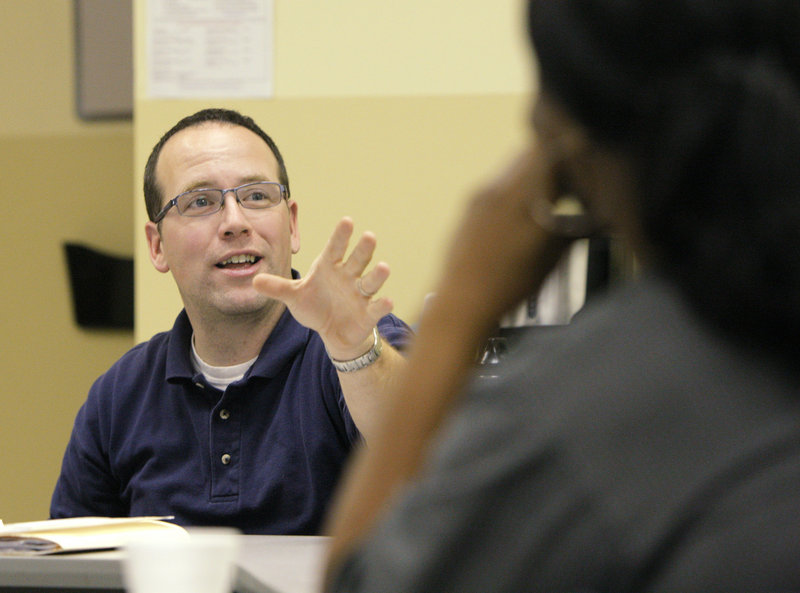PORTLAND – It’s 7:30 a.m., and Portland’s General Assistance office is filled with men and women who need help paying their rent or some other basic expense.
But they’re here for the day’s job assignments.
One by one, they are sent off to clean the city’s homeless shelter, do laundry at the Barron Center, clean up a park or do clerical work at City Hall, among other tasks.
These days, for thousands of Mainers, welfare is work. And people on the receiving end say they like it that way.
“I used to say these people are living off the state, and now I’m getting help,” said Chris Conley, an unemployed 22-year-old. “That’s why I like the work. I don’t want to feel like it’s handed to me.”
Helping more Mainers move from welfare to work, by providing job skills, experience or education, is the one reform that virtually everyone supports. There already are a number of work and work-training programs in place at the state level and in communities such as Portland, where the strategy is called the Workfare Program.
In an economy that increasingly demands education and experience, such programs are considered the surest path to independence.
While anybody can fall into the state’s safety nets, a person’s education level is closely linked to how long it will take to climb out, according to a survey of parents receiving Temporary Assistance for Needy Families. The Maine Equal Justice Partners commissioned the study and plans to publish it this month.
But training programs, work counseling and other pieces of welfare-to-work programs cost money, and public assistance programs are straining now to keep poor Mainers fed and sheltered.
“If I were to reform welfare, one of the places I would look is how can we invest so current participants can have opportunities for education and training,” said Brenda Harvey, commissioner of the Maine Department of Health and Human Services.
At the same time, she said, work is already part of welfare for thousands of Mainers who apply for Temporary Assistance for Needy Families, or TANF.
More than half of the 14,000 Maine parents now receiving TANF cash assistance, the portion who are deemed able, are required to spend 30 hours each week doing some form of work activity. About 20 percent have part-time or low-paying jobs, according to state officials, and the rest are looking for work or preparing for work, or both. Each is assigned a specialized caseworker who helps him move toward full employment.
After national welfare reform in 1996, Maine created an education program called Parents as Scholars. The program supports parents who want to pursue a two- or four-year college degree as their work activity.
Maine spends about $3.4 million a year — split roughly evenly between state and federal funds — to support about 650 students at a time, paying for child care, transportation and other expenses. Students have to get scholarships or financial aid to cover tuition.
There are lots of conditions, such as keeping grades up and no degrees in subjects such as art or philosophy. “People have to be able to get a job” with the degree, said Terry Hamilton, who heads the DHHS regional office in Portland.
Many consider Parents as Scholars a model that ought to be expanded, especially with more of Maine’s new jobs requiring college degrees.
“As the economy changes, we have to do much more to give people an opportunity to participate in that economy,” said Nicole Witherbee, an analyst who studies poverty trends in Maine.
Some Maine cities, including Portland, have turned General Assistance into a work-training program.
Workfare provides on-the-job experience as recipients “work off” their assistance. In Portland, workfare recipients also have to look for jobs and attend employment workshops focusing on resume writing, interviewing skills and other things.
Portlanders who need city help and are not disabled might work as much as 40 hours a week, depending on how much aid they need. The aid is worked off at minimum wage.
Portland enrolled 557 people in the Workfare Program in the past year, almost three times the number of people enrolled before the recession.
The program requires managers and willing supervisors around the city. But finding work is not hard, especially with the people coming for help during the recession, said Aaron Geyer, senior human services counselor for the Portland Department of Health and Human Services.
“We’re getting more and more skilled people,” Geyer said. “It really helps people stay sharp for when work opens up.”
Diane Karambizi said the experience has prepared her for a new life.
The 27-year-old left Rwanda for safety reasons and ended up in Portland about a year ago. She had a degree in economics but could not speak English.
“I came with nothing. I needed shelter,” she said. She started workfare by doing laundry and cleaning, but quickly learned to speak English and now works four hours a day at the front desk of the city’s refugee resettlement office.
“It helped me a lot to know how the (employment) system works here, to learn English and also of course to feel like I’m not taking advantage of the city,” Karambizi said.
Now, she said, it is just a matter of time to find a good-paying job. “It feels good. Very soon I will be independent.”
Conley, who recently got certified as a weatherization technician, also is sure he won’t be “on the state” much longer.
As part of receiving General Assistance, he has to apply to at least four jobs each week, he said.
“I’ll definitely get a job,” he said. “It won’t take me long.”
Staff Writer John Richardson can be contacted at 791-6324 or at:
jrichardson@pressherald.com
Send questions/comments to the editors.



Comments are no longer available on this story